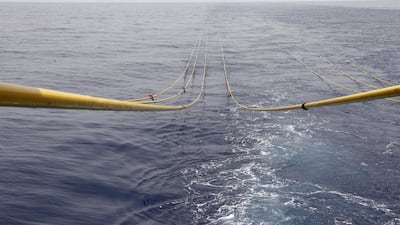The Lebanese Petroleum Administration (LPA) will hold talks with an international consortium led by French oil major Total and Italy’s Eni, as the body that governs upstream oil and gas operations in Lebanon prepares to award exploration licences amid heightened political uncertainty in the country.
"The ministry has already sent a letter to the consortium to negotiate with them, and that is set to take place on the 27th, 28th and 29th of this month," a senior LPA official told The National. He declined to be named as discussions are private. "After that a report will be sent to the council of ministers to award petroleum licences.
"A caretaker government is needed to approve petroleum licences, however [the] LPA is preparing the documentation and the [energy] minister will submit the report by the end of the year and exploration work can begin after that," the official said. “The minister has [already] declared that the offers are good and will take a decision to award blocks four and nine,” he noted.
The resignation of prime minister Saad Hariri earlier this month has plunged the tepid restart of Lebanon's offshore licensing round into confusion. Lebanon currently burns environmentally inefficient fuel oil to generate electricity and imports nearly 90 per cent of the fuel to meet power generation needs. Influx of refugees fleeing the civil war in neighbouring Syria has swelled its population numbers and added to rising power demand. It has also increased public debt, which had led to missed payments for fuel oil imports in the past, highlighting the dire need for exploration of gas. However, Lebanon was unable to proceed with a planned licensing round for nearly four years as it lacked a stable government to oversee the tendering process.
______________
Read more:
Lebanon's Hariri 'will be back in Beirut by Independence Day'
Macron invites Hariri and family to France
______________
Following the formation of the new cabinet in December, the Lebanese energy and water ministry announced plans to relaunch the licensing round for five blocks in the Mediterranean, which has in recent years, yielded high-profile discoveries offshore Israel, Cyprus and Egypt.
According to some Lebanese government estimates, the territorial waters of the country could hold as much as 96 trillion cubic feet of natural gas and 850 million barrels of oil, which could translate into huge savings for its economy and end its dependence on fuel imports.
LPA had pre-qualified around 51 firms, which included oil majors such as Shell, Total, Chevron and Exxon Mobil. The Lebanese government had also passed the much-awaited petroleum tax law in September, just ahead of the October deadline for companies to form consortia of three to submit bids.
A team of Total, Eni and Russia’s Novatek submitted two bids for blocks four and nine. Block nine lies in disputed territory with Israel, which remains at war with Lebanon and has threatened arbitration should Beirut sanction exploration work in the area.
While the scope of the bids received remains unknown, they might not be very attractive to the Lebanese government, which may have little choice but to accept the terms from the bidding consortium, Carole Nakhle, chief executive at London-based energy consultancy Crystol Energy said.
“Most likely, whatever the companies placed on the bid, it’s not attractive for the government. It’s attractive for the companies. The companies must think the risk is worth taking as long as they expect a rate of return commensurate of that risk," she said.
“The LPA submitted their review of the bids to the minister but the final approval from the council of ministers may be delayed because of the resignation of the prime minister, which risks stalling the process if the formation of a new government takes time to materialise,” she noted.
A spokesperson for Total said the that its bids in consortium with Eni and Novatek were currently were being reviewed by the Lebanese authorities, but declined to comment further. Eni and Novatek referred requests for comment to Total.
Lebanon has also long considered the possibility of importing liquefied natural gas (LNG) as a substitute for fuel oil, however, that plan was put on the back-burner due to political instability. In October, the Lebanese energy ministry said the country planned to tender three LNG import terminals but the project has yet to be sanctioned by the cabinet.


